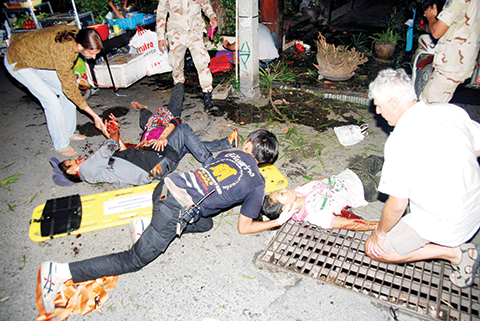 In this Thursday, Aug. 11, 2016, photo, the injured are helped after a bomb blast in the southern resort city of Hua Hin, 240 kilometers (150 miles) south of Bangkok, Thailand. Police are investigating a series of bomb blasts in Hua Hin and other cities in Thailand. (Daily News via AP)
In this Thursday, Aug. 11, 2016, photo, the injured are helped after a bomb blast in the southern resort city of Hua Hin, 240 kilometers (150 miles) south of Bangkok, Thailand. Police are investigating a series of bomb blasts in Hua Hin and other cities in Thailand. (Daily News via AP)HUA HIN, Thailand: A series of blasts hit three of the most popular tourist resorts as well as towns in southern Thailand on Thursday and yesterday, killing four people and wounding dozens, days after the country voted to accept a military-backed constitution. Four bombs exploded in the upscale resort of Hua Hin, about 200 km (125 miles) south of Bangkok, on Thursday evening and yesterday morning, killing two people and wounding at least 24.
Other blasts hit the tourist island of Phuket, a resort town in Phang Nga province, and Surat Thani, a city that is the gateway to popular islands such as Koh Samui in Thailand's Gulf. Hua Hin is home to the Klai Kangwon royal palace, which translates as "Far from Worries", where King Bhumibol Adulayadej, the world's longest reigning monarch, and his wife, Queen Sirikit, have lived in recent years. Neither were there during the attacks, as both are in hospital in Bangkok.
Yesterday was a public holiday in Thailand to mark the queen's birthday, which is celebrated as Mother's Day. No group has claimed responsibility, though suspicion could fall on insurgents in Muslim-majority provinces in southern Thailand.
Police detained two men for questioning over the attacks on Hua Hin yesterday, said Police Superintendent Sarawut Tankul of the tourist police at the resort. They were detained because CCTV footage showed them in the area "before, during and after the bombings", he said, declining to give more details. Preliminary evidence showed the bombs were low-explosive devices devised to "make an announcement" rather than cause maximum harm, he said.
Ahead of the blasts, Police had intelligence an attack was imminent, but had no precise information on location or timing, national police chief Chakthip Chaijinda told reporters in Bangkok yesterday. "We just didn't know which day something would happen," he said.
Meanwhile, the State of Kuwait Ambassador to Thailand Abdullah Al-Sharhan yesterday announced that the embassy formed an operation room immediately when the nation was rocked with a string of explosions, noting that the special chamber was set up with aim of ensuring safety of Kuwaiti citizens.
The ambassador, according to a statement released by the Foreign Ministry, affirmed that he and the mission were following up on situation with the relevant authorities, noting that initial results of these contacts revealed that there were no Kuwaiti casualties among the blasts' victims.
He urged Kuwaiti nationals in Thailand to be cautious, cooperate with the security personnel and contact the embassy if the need arises on the emergency number: 0066918909998 or on the Kuwaiti Foreign Ministry's emergency phone numbers" 98007888 or 98007999.
Since Sunday's referendum on the constitution, there have been attacks in seven provinces using improvised explosive devices and firebombs, Chakthip said. The devices were similar to those used by separatist groups in southern Thailand, but that did not conclusively show they were the perpetrators, he said. Police ruled out any links to international terrorism, as did Thailand's Foreign Ministry, which said in a statement yesterday: "The incident is not linked to terrorism but is an act of stirring up public disturbance." Bangkok-based analyst Anthony Davis, at security consulting firm IHS-Jane's, questioned the police assertion that the attacks were an act of local sabotage.
The coordinated bombings were "designed to terrify and to blow a hole in the tourism industry", said Davis. "The tactics used were clearly intended to minimise casualties while maximising economic and political impact. It is worth noting that no foreigners died in the attacks." Thai authorities beefed up security at tourism spots, airports and on public transport in Bangkok. "Why now, when the country is getting better, the economy is getting better, and tourism is getting better? We have to ask why and who did it," Thai junta chief and Prime Minister Prayuth Chan-ocha told reporters.
Travel advisory
The attacks are bad news for Thailand's tourist sector, which has been one of the few bright spots in a sluggish economy. Tourism accounts for about 10 percent of gross domestic product and Thailand was expecting a record 32 million visitors this year. Australia issued a travel advisory saying Australians should "exercise a high degree of caution" and warned: "Further explosions in any part of Thailand are possible." - Agencies










